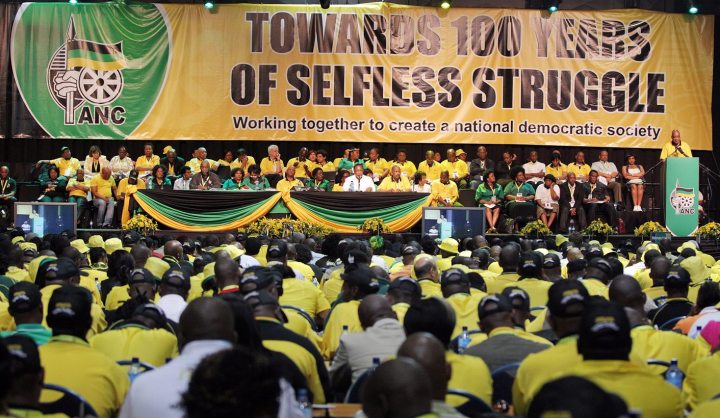Maverick Life, South Africa
Media freedom: An open letter to delegates to the ANC’s National General Council

Press Council of South Africa executive director JOE THLOLOE urges the African National Congress to give freedom of expression and freedom of the press and other media the in-depth treatment they deserve, in an open letter to delegates to the upcoming national general council.
Dear delegates,
I’m aware that you have hundreds of documents to go through in preparation for the African National Congress national general council (NGC) this weekend and that I shouldn’t in all fairness be adding to your burden.
However, as I was going through the discussion documents that you will be dealing with there I bumped into two throwaway lines that deserve in-depth treatment as in this part of your discussions you will be deliberating on one of the cornerstones of our democracry – freedom of expression and freedom of the press and other media.
These throwaways lines, at paragraph 181, are: “(The) ANC still believes that the existing self-regulatory mechanism (the Press Ombudsman and Press Council) remains ineffective and needs to be strengthened” and “… there is still a need for a rigorous debate and resolution on the establishment of accountability mechanisms that are independent and provide for an independent appeal mechanism”. (My emphasis.)
The danger with such throwaway lines is that they become a mantra that people chant and ultimately believe before they examine them critically.
And I do get worried when no less a person than Minister of Small Business Development Lindiwe Zulu, an ANC national executive committee member, who is said to have presided over the drafting of the NGC documents, repeats the mantra (see last Sunday’s newspapers). She was until recently, the chairperson of the communication and media committee of the ANC.
She reportedly told City Press the idea of a media appeals tribunal … was still very much alive and would be one of the focal points of discussions at this midterm review.
City Press reported: “Zulu was adamant that the existing self-regulatory system – since changed to independent co-regulation – through the press ombudsman and press council was ineffective and needed to be strengthened …”
“Sometimes there is a feeling that we are just open to any kind of attack and we have no recourse at all. We want recourse, just like the media does,” she said.
“If it had not been for the fact that we have seen terribly unbalanced reporting around us, I’m sure we would not be in this space of looking at the tribunal. It’s because we are just realising that even if there are good things happening, the media prefers not to talk about them.”
This surreal logic stems from believing throwaway lines that, on examination, will be found to be empty slogans.
Let’s try and follow the minister’s logic, which starts off: “If it had not been for the fact that we have seen terribly unbalanced reporting around us, I’m sure we would not be in this space of looking at the tribunal. It’s because we are just realising that even if there are good things happening, the media prefers not to talk about them.”
I translate that to be: “It’s because of terribly unbalanced reporting that we are still considering a media appeals tribunal – good things are happening and the media prefer not to talk about them.”
For her, balanced reporting is when the media also talk about the good things in society.
Therefore an effective regulatory mechanism would be one that forces the media to talk about even the good things, in other words, one that prescribes what editors may or may not publish – forget the rights enshrined in Section 16 of South Africa’s Constitution.
We, on the other hand, measure effectiveness differently:
We judge the effectiveness of the mechanism by the number of people who use it, a number that has shot up – we even receive complaints about services not related to journalism. And the number of ‘thank you’ notes we get from satisfied complainants is gratifying, for example, this one from Graeme Smith’s lawyer:
Dear Mr Retief
Thanks for the response. It is a very sound judgment on all fronts in our view and I have been impressed with the process especially, since this is so much more pragmatic than going through the courts.
Kind regards,
David
Or the following:
Letter 2.
Hi Latiefa,
I just wanted to say thank you again for the wonderful assistance you gave me with regard to the matter between ourselves and the Daily Voice. The follow-up article has been published along with the retraction and apology, which would have been almost impossible without your intervention.
Thank you for your genuine interest in the matter, and dedication in helping us to rectify it, and thank you also for you friendliness throughout the process. It was lovely dealing with you, and I know the organisation is voluntary, so I can only hope that people continue to support the cause, and acknowledge the difference you make in society; without your organisation the general public would find speaking out against the wrongs brought against them in the press world very, very difficult, and that would be a great injustice.
Have a lovely day further!
Kind regards,
Cindy Meissenheimer
Sales & marketing & press liaison
Letter 3
Thank you, Latiefa for the important role your office plays as an interface between the press and the public, and to Jacques (the Independent’s lawyer) for his professionalism. Good to know that the high standards of the profession are being maintained.
Justice Azhar Cachalia
Supreme Court of Appeal, Bloemfontein.
Also, see video titled In the name of democracy:
Statistics
Last year, 2014, we received 461 complaints, down from the 537 of the previous year and the Ombudsman ruled on 108 of these as against the 142 rulings the previous year. The rest were settled amicably between the publication and the complainant after the intervention of our public advocate.
|
Month |
No of complaints in 2014 |
No of complaints in 2015 |
|
January |
24 |
28 |
|
February |
43 |
62 |
|
March |
47 |
50 |
|
April |
41 |
45 |
|
May |
26 |
50 |
|
June |
47 |
59 |
|
July |
47 |
52 |
|
August |
44 |
36 (as at August 25) |
So far this year the ombudsman has made 93 formal findings compared to the 78 rulings during the corresponding period in 2014. This can be ascribed to the dramatic increase in the number of complaints that we have received so far in 2015
Judge Bernard Ngoepe has made the following observations about his work in the Press Council: “We suddenly received a large number of applications for leave to appeal to the Appeals Panel. However, most of them had no merits, which is why we have had only a few Appeals.”
Is the Press Council independent?
One needs only to look at the architecture of the Press Council to realise that it is truly independent, even of the publications that subscribe to it. The council is led by Judge Phillip Levinsohn, formerly the deputy judge president of KwaZulu-Natal, and consists of six public representatives and six press representatives. If you count the judge and the six public representatives against the six press representatives you will realise that the non-industry voice is bigger than the industry voice in it. I should also mention that another retired judge, Judge Ralph Zulman, formerly of the Supreme Court of Appeal, is one of the public representatives.
The same pattern holds for the Panel of Adjudicators: it is headed by Judge Ngoepe, formerly judge president of North and South Gauteng. It has eight public representatives and six press representatives.
The chairperson of appeals and the chairperson of the Press Council were recommended by Chief Justice Mogoeng Mogoeng.
Any of the parties to a dispute may take the rulings of the ombudsman on appeal to Judge Ngoepe.
And the rulings of the Press Council may be taken to the courts for review.
(The rulings can be seen on our website and no bias in favour of the press can be found there. On the contrary, our statistics show that two-thirds of the rulings are in favour of complainants.)
The public members of all the organs of the Press Council are appointed by an appointments panel chaired by a retired judge, who, this time, was Justice Yvonne Mokgoro. South Africans were invited through all the publications that are our members to apply for the positions or to nominate suitable persons. The criteria for applications were that the person be interested in standards of journalism, be interested in current affairs, and that they be passionate about freedom of expression and freedom of the media. The public members were appointed after they were interviewed by the panel and found to be suitable.
Yes, we are funded by the industry, but we have created a strong wall between ourselves and the industry to guarantee our independence. At the end of each year, the Press Council draws up a budget for the coming year and submits it to the industry body, Print and Digital Media South Africa, which is obliged to fund the reasonable expenses of the council. At this point, we do debate the budget until we get to an agreement. If we can’t reach agreement, the dispute is to be settled by an independent arbitrator. So far, we have not had to use an arbitrator. The amount we agree on is divided among the more than 1,000 publictions that subscribe to our system. It’s a well-crafted wall between us.
Are we perfect?
Hell, no. The Press Council is a work-in-progress, getting a facelift every so often. It is currently undergoing another major shake-up as we embrace the new world of online journalism, in response to changes in the environment.
We have always welcomed a chance to explain our system to Parliament in terms of the resolutions of the last NGC and to accept any constructive suggestions on how we could improve on our system. We are still waiting for the invitation.
As you prepare for the important work that lies ahead, please take our letter into account.
Regards,
Joe Thloloe
Executive director, Press Council of South Africa
Photo: South African President Jacob Zuma (R) gives the clenched fist salute as he addresses the opening session of the ruling African National Congress (ANC)’s national general council in Durban, South Africa, 20 September 2010. EPA/JON HRUSA




















 Become an Insider
Become an Insider